|
Thanksgiving is one of the most quintessential American holidays. Eating turkey and stuffing, watching football, and spending time with family are some of the most prominent themes throughout the holiday. Yet, with all the stress of cooking, the big game, and holiday travel, we can sometimes find ourselves missing the true meaning of Thanksgiving. I know, for me, with all the stress of the holidays, it feels like the only time I can think about the things for which I am thankful is during grace at the dinner table. An entire year's worth of gratitude is simmered down to two minutes of frantic thinking when my turn arrives from around the table. I am trying to incorporate more time for grappling with this question of thankfulness throughout the year and not just at the holiday season. For example, it can be so routine and easy in prayer to ask for something from the Lord or to barter with Him (Lord, if you do this, I will do that). It is something that we all do, yet how often are we thanking the Lord in our prayer? Not just thanking Him for an answered prayer but also for the little moments throughout our lives: thanking Him for a quick commute home, for a found car key, or even for a really good cup of coffee after a sleepless night. It is these little moments that I found bring me the greatest gratitude, these little moments that make up such a small part of my life but greatly impact the cadence of my day. In a similar way, I have tried to find saints whose patronage may align with something that is going on in my life or with whom I feel a connection. The Catholic Apostolate Center’s Feast Day site is a wonderful resource for looking into some saints that may interest you. From there, I can ask these saints for their intercession in my daily life and thank them for their prayers. Feast days are a great time to give thanks to the specific saints that mean a lot in your life. When saying grace at mealtimes, it may be nice to include a “shout out” to special saints in your life on these days to give gratitude to them. I’ve also tried to bring a similar technique into my friendships. I have found that since graduating college and after the COVID-19 pandemic, I am even more grateful for spending quality time with my friends. I’ve made it a sort of habit to try to message those who mean the most to me and thank them for our quality time together. It can be as simple as “Thank you for listening to me today,” or “I really enjoyed spending time with you today.” When doing so, I find myself reflecting on the time that I spent with my friends and enjoying the memories of our time together. In prayer, I have found myself trying to be more present in the moment, more thankful, and more reflective in my thoughts. I try to write down the moments when I find myself needing grace and the moments when I am thankful for the most mundane things, and then I keep a record of them either in a physical journal or on the Notes app on my phone. When going into prayer, I like to call on this list and let it inspire my prayer of thanksgiving for these moments. I also like to look at this list when I’m feeling down or upset, as it helps me to refocus on the positive moments in my life. Gratitude does not need to be a big thing that only happens once a year. It can be practiced daily through prayer and throughout our daily activities. Finding five minutes a day to practice gratitude exercises, work on gratitude journaling, or call a loved one can fill our hearts with joy this Thanksgiving season and can be implemented throughout the year to keep our spirits high.
0 Comments
Beauty transformed my soul—waking it up from the depths of hibernation and shaking loose the layers of grief, bitterness, and resentment which had grown over time. My heart could not resist the lure of cobblestone streets, golden light cascading down narrow alleyways, or the shadows of the towering cathedral. I felt alive during those months abroad in a way I had hardly known was possible. Afternoon jogs on an ancient Roman bridge. Secret courtyards and hidden gardens overlooking the city. Tucked-away alcoves and incense emanating from ancient chapels. A croissant shop with an expansive menu that dared me to try them all. I did, by the way, try them all. I had goals like that while I was studying abroad. For the first time in many years, the over-achiever A-student was not living for grades and recognition. She was living for experience, for delight, for beauty. And in this was a newfound freedom. I remember sitting in the cavernous cathedral of Salamanca for long stretches between classes breathing in the music that played softly between services and basking in the magnanimous splendor. Moments like this made me long for something outside and above myself, though I could not precisely say what or why. Only later would I come realize it was the Bridegroom Nicholas Cabasilas writes of in “The Life in Christ” calling me to glimpse the eternal I was created for. Cabasilas explains, “When men have a longing so great that it surpasses human nature and eagerly desire and are able to accomplish things beyond human thought, it is the Bridegroom who has smitten them with this longing. It is he who has sent a ray of his beauty into their eyes. The greatness of the wound already shows the arrow which has struck home, the longing indicates who has inflicted the wound." Beauty wounded me that semester in a delightful way. It awakened my heart with a longing to reach for what transcends human experience: the eternal. My experience living abroad enabled me to delight in creation and life in a way people seldom do or ever get the chance to. And this knowledge humbled me profoundly. “I do not deserve this,” I thought many times throughout my studies abroad. What had I done to earn the experience of such majesty? The short answer: nothing. It was sheer, unmerited gift. I knew almost immediately who the gift givers were. First: my parents, who had spent their lives providing for their children and modeling servant leadership and sacrificial love. It was because of them and their contributions to my education that I was able to study abroad in the first place. The other gift giver: God himself—the author of beauty. It was in this way that God revealed himself to me personally and began to bring me back to himself. The famous line from Dostoevesky, “Beauty will save the world” started for me that fall in Spain. Beauty saved me. God, beauty itself, the author of beauty, created us with a desire to grasp at and experience beauty in order to draw us closer to himself. Beauty is sheer gift—unnecessary by logical standards and not necessarily functional or efficient. It does more than just appeal to our senses: it awakens our soul. It is meant to draw us outside of ourselves with what Cardinal Ratzinger at the time called a “longing for the Ineffable, [a] readiness for sacrifice, [and lead to] the abandonment of self.” Furthermore, “Beauty does not end with us or with our experience, but calls us outward on mission. Artistic beauty provokes interior emotion, it silently arouses astonishment and leads to an ‘exit from self’, an ecstasy” (Pontifical Council for Culture, Plenary Assembly Final Document-The Way of Beauty. section III.2, The Beauty of the Arts). This was my experience exactly. I came home a different person—one overflowing with gratitude and humility. It manifested in frequent phone calls to my family, much to their concern. The formerly independent, cold, aloof daughter was calling her parents each week to say thank you and to check in. After ascertaining that my mental health was still sound, my mother offered wise advice to her daughter now bubbling with gratitude: spend 5 to ten minutes a day thanking God. Beauty was, therefore, God’s entry point into my heart. As a result, I turned back to him in praise and thanksgiving. My friends and family noticed the transformation, the newfound peace that overflowed, the eyes now on the lookout for glimpses of the Creator hidden among his creation. Beauty resulted in action—slow and gradual, but intentional in my remaining college years. I entered the Campus Ministry office for the first time upon my return stateside. I began making use of the Sacrament of Reconciliation weekly and sitting in the beautiful mission church of my alma mater for daily Mass. I attended retreats, began participating in service opportunities, and mentored younger students. Beauty drew me outside of myself and into the other—I had received an unmerited gift and wanted to reciprocate the giving. As Bishop James D. Conley said at an apologetics conference, “When we begin with beauty, this can then lead to a desire to want to know the truth of the thing that is drawing us, a desire to participate in it. And then the truth can inspire us to do the good, to strive after virtue.” Almost a decade later, as a mother of small boys, often limited to the sphere of my domestic church, how and where can I experience beauty? How can each of us, in whatever vocation we find ourselves in, find and experience beauty? After a year in which sin, division, sickness, and isolation threatened to obscure the beauty of life and our world, I believe we are called to reclaim this truth and open our eyes to the beauty and wonder of God once again. Beauty is not reserved for a special place or time, but can be found all around us: in the newborn’s first cry, the child’s wonder, the cicada’s song, the family dinner, the work done well, the priest’s sacrifice, the nun’s contemplative prayer, the humor of a colleague, the glowing of the stars, the dawn of a new day. Let us allow ourselves to believe and hope in the glimmers of beauty all around us that reveal a greater beauty we are called to. Let us strive to make the world more beautiful with our kind words and gestures, deeds done with love, hope, and joy, with the way we relish life as a gift and inspire laughter, with the way we live our lives authentically—in such a way that others are drawn to the joy of our Gospel message. Why? So that the world can see and come to know him. The ultimate purpose of beauty is redemption—knowing and experiencing Christ himself. The then-Cardinal Ratzinger put it so well, “We must learn to see him. If we know him, not only in words, but if we are struck by the arrow of his paradoxical beauty, then we will truly know him, and know him not only because we have heard others speak about him. Then we will have found the beauty of Truth, of the Truth that redeems. Nothing can bring us into close contact with the beauty of Christ himself other than the world of beauty created by faith and light that shines out from the faces of the saints, through whom his own light becomes visible.” 3/20/2020 In This Together: A Resource Guide for Families During Coronavirus Quarantine | COVID-19 ResourceRead NowTo all the parents home with their children, who are looking for creative, easy, or fun ways to spend the day, here are some great options to try for spiritual, mental, and physical health! Set a routine. It is important to establish consistency and keep kids on a structure like they are during a school day. For older children, have them collaborate with you as you create a schedule to allow for some influence on their day. It allows for predictability in the day, and children knowing what is expected of them is crucial to the well-being and peace of all in the family. Below is a schedule example. This can be used as a starting place for your family. Feel free to move things around or dedicate your time differently. What’s important is maintaining a routine that works for your family! Example:
Focus on gratitude. With many feeling anxious and having to deal with a lot that is so unknown, having a grateful heart can mean a world of difference for your well-being and that of your family. Have your child write thank-you-notes to mail carriers, restaurant workers, grocery store employees, and members of the family. Or, start the day by finding 3 things to be grateful for, then end the day like that too. Talk about this with your child and share your gratitude with them.
Prayer. There is nothing more powerful than prayer, and prayer as a family is crucial during this time at home together. Make time. Take time. Add it to a daily routine. In addition to saying prayers you may know by rote, consider reading the Daily Readings from USCCB to read the Word together in prayer. Play! For young children, older teens, and everyone in between, play is crucial. For older children that may mean down-time or free time to decompress, but for young children in elementary school this is so important for development. Playing together, but also playing independently helps support their creativity. As a parent, also take some time to think of ways you can “play”—not only with your children, but with your spouse or on your own. Make sure to come up with fun activities that are life-giving for you and your spouse: board games, a puzzle, baking, etc. Pretend and make believe. “Boredom breeds creativity” I was once told, and I couldn’t agree more! When children are given a chance to imagine and pretend away from distractions and technology they will think up all kinds of incredible things. As a parent, you may need to guide or inspire some pretend or make-believe with prompts or guidelines until your kids seem ready to take-off on their own. Even giving your child a difficult or challenging task and saying, “figure it out” may help for older kids who need to problem-solve. But here are some ways to get started:
Exercise. For children of all ages and adults too, exercise is so important. Although we must consider social distancing, getting outside and even just taking a walk is more crucial than ever as we are in our homes all day long. If you don’t have a yard to play in, try walking to the closest field or park to catch a ball or ride a bike around the neighborhood. If you cannot get outside, there is plenty to do inside. YouTube has workouts for children and adults, and there are workouts on Netflix and other streaming services to get you started. Write letters. This is a nice thing to do at all ages and levels of writing abilities, young ones can draw pictures and write what they can, while older kids could tell someone all about their latest adventure at home. Write to grandparents, relatives, elderly folks in nursing homes, neighbors, and friends from school who are also at home. It’s amazing how good someone may feel receiving a note or letter, knowing your child was thinking of them. Call someone, FaceTime, or video chat with someone. We are blessed in this digital age to have technology that can still keep us “together.” Calling friends, family, and loved ones, either on the phone or using a video chat application, maintains and strengthens our relationships with people we may not be able to see or visit right now. Read a book. Have your child help you create a booklist of 50 or 100 books and see how many they can read, then have a fun prize like baking cookies together or extra down-time be the reward. Activity pages made by teachers. For kids who are out of school altogether, look for materials online to keep kids up to speed on math skills, reading activities, and everything in between. With schools shut down, there is plenty out there to find! Make your own studying tools. Don’t forget that anyone (including the student) can make flash cards for addition, subtraction, multiplication, and division - as long as you have paper and something to write with! Some drills you could practice:
Fine motor development. Play with Play Doh (or make your own). Squeeze items with tweezers. Count and play with beads or buttons. Bake and roll out dough, ball up cookies, or knead pizza dough. We are living in unprecedented times which can add to the stress level of family life. We invite you during this pandemic to see this as a blessed time to rekindle relationships within your families and communities through prayer, play, and creativity and hope these resources will prove fruitful for you as we continue to navigate this time. Click here to visit our COVID-19 Resource Page Click Here to Download this Post as a PDF! As Americans gather around the dinner table for the annual Thanksgiving meal, families have the opportunity to recall and be thankful for the blessings in their lives. The true focus of this national occasion is not simply to marvel at the bounty of food upon the table, but to acknowledge the labors and gifts which directly and indirectly impacted one’s quality of life. As Christians, we know that all thanksgiving is oriented towards God as families join hands and bow their heads in prayers of gratitude. Attitudes of gratitude don’t need to be restricted to the fourth Thursday of November, but can be prevalent in our hearts, minds, and daily lives throughout each year.
True expressions of thanksgiving are rooted in the acknowledgement that nothing in this life should be taken for granted. The blessings of life ultimately come from God’s innate goodness, and Scripture details many occasions of gratitude to God that are often accompanied by offering sacrifices or praise. We read in the psalms, “I will praise God’s name in song and glorify him with thanksgiving” (Psalm 69) and “Let us come before him with thanksgiving and extol him with music and song.” (Psalm 95) Thessalonians reminds us to “give thanks in all circumstances” and Ephesians similarly admonishes us to “always giving thanks to God the Father for everything.” Thanksgiving is a fundamental component of a life of faith. Furthermore, the sacrifices God is interested in include the sacrifice of our pride in favor of humility, the sacrifice of personal desires and wants in favor of trust in His will, and the sacrifice of sinful behaviors in favor of living the life of holiness God has desired for us. As Catholics, we are infinitely grateful for the ultimate sacrifice of Christ upon the cross and the means God Himself has instituted for our embrace of the gift of salvation. As such, the highest form of prayer on earth is participation in the Holy Mass and the direct reception of Christ’s body and blood in the Holy Eucharist (which itself means “thanksgiving”). Thanksgiving disposes our hearts to more fully receive Christ and be transformed by His love. By imitating Jesus, who broke bread and gave thanks to His Heavenly Father prior to his Passion, we are given the strength to similarly give thanks in all circumstances and grow more Christ-like as a result. Of the many pieces of spiritual advice I’ve been given by priests, the reminder to grow in gratitude for what God has given me is a constant opportunity to realize my utter dependency on His providence. In gratitude lies true joy. This Thanksgiving, I invite you to celebrate an attitude of gratitude that overflows into the new year and the years to come. It is fitting that as I write this blog in anticipation for National Vocation Awareness Week, the liturgical calendar has us moving through Paul’s letter to the Romans. In this letter, we find Paul emphasizing that we are now entering into a ‘new exodus.’ Just as Israel was liberated from Egyptian slavery, we are now liberated from the slavery of sin. The sacraments of Baptism and the Eucharist are the means by which Catholic Christian believers are joined to the new Exodus. Baptism is prefigured by the Israelites’ passage through the Red Sea, and the Eucharist is prefigured by the manna and the water from the rock in the desert. As we know well, the story does not end at our baptism. Rather, it is there that the story begins. Israel, having escaped from Egyptian slavery, quickly discovered that serving the Lord was even more demanding on the will than serving Pharaoh. In order to reach the Promised Land, the people of Israel had to take a path through a wilderness of trials and temptations. This path required a valiant conquest of all the obstacles of sin that stood in their way. In fact, the difficulty of the journey had some yearning for the days when they were slaves in Egypt. As children of the ‘new exodus’, our vocation in life is to travel through the wilderness of human life. Our exodus differs from the old in some ways, though. Our proclamation of the freedom found in Christ occurs while we travel. Our baptismal vocation calls us to ongoing sanctification, but it also calls us to witness this great exodus from sin and the new freedom in and won by Jesus Christ. We often desire the commitment to this ‘new exodus’ after seeing the commitment of others. This is a point that Fr. Luigi Giussani makes in his book titled, Is it Possible to Live this Way?. Fr. Giussani stresses the necessity of faith by which one encounters Christ indirectly through the witness of another. This witness tugs at our hearts to the point where we have no choice but to respond. Witnesses are therefore crucial to our discovery of this vocation - a vocation to partake in the new exodus. In my own life, my first example of such witnesses began with my parents. They not only gave me life, but they witnessed the faith by making the home a domestic church. Their marriage provided a template for me in my own vocation. They helped me see that the expression of freedom from the tyranny of selfishness comes through a spousal love. This spousal love is not exclusively expressed through the sacrament of matrimony, but it is also expressed through the sacrament of holy orders. As a diocesan priest, my local church in Harrisburg, particularly St. Francis Xavier in Gettysburg, is in a sense my spouse. I could not have such an understanding were it not for the witness of my parents. In addition, every seminarian and newly ordained priest can think of at least one other priest who first witnessed the presence of Christ to them through their own ministerial priesthood. In my case, I watched and learned first from my childhood pastor in New Hampshire, Fr. Marc Montminy. He was, and continues to be, a witness of Jesus Christ and a faithful spouse of the Church. Other priests who have taken on a similar role in my life are Fr. Frank Donio, S.A.C. (the Director of the Catholic Apostolate Center), priests of the Diocese of Harrisburg, faculty priests at Mount St. Mary’s Seminary, and priests elsewhere. As a priest, I seek (despite shortcomings and failures) to always be attentive to this desire - a desire to reach the promised land of eternal life through this new exodus. This is only possible because I have encountered people who not only accompanied me in discovering this desire, but who also witnessed it. This is, in essence, what it means to be a ‘humana viator’ (a wayfaring pilgrim). This is what it means to be an apostle. This is what it means to imitate Jesus Christ, the apostle of the Father. This is what it means to fulfill our baptismal vocation. During this National Vocation Awareness Week, may we be more attentive to this desire. May we recommit ourselves to this new exodus, which we have already begun through our baptism. May we also maintain and express our gratitude for those who have (and continue to) accompany us as witnesses. For more resources on Accompaniment, please click here. For more resources on Vocational Discernment, please click here. O God, Thou art my God, I seek Thee, my soul thirsts for Thee; my flesh faints for Thee, as in a dry and weary land where no water is. -Psalm 63:1 There are seasons in the spiritual life in which you feel parched, as if you’re wandering the desert without refreshment. Silent reflection is filled with distraction. Prayer seems awkward, difficult, or boring. Your heart feels lifeless. Lately, despite my attempts to find escape, this sums up my prayer experience. It doesn’t matter that I infuse my days with the Mass readings, a Rosary, Catholic podcasts, or spiritual books. Right now, it seems so much easier to turn on a show or scroll through social media than to pray. Any time I resolve to do the latter, all the things I need to do bombard my mind, or the texts and notifications come in streaming. At Mass, I hear the beautiful words of Scripture and the homily but feel hollow in the pew. Am I a bad Catholic? Is something wrong? During times like these, many people of faith get disheartened. They think they have done something wrong in the spiritual life, that God has abandoned them, or that their faith must not be relevant anymore. But all people of faith will experience this to some degree at one point or another! It is often hard to trudge through when warm feelings are absent and prayer requires intentionality and effort, but these times in the spiritual life can be the most fruitful of all. Our hearts can grow cold and tepid for two reasons: either we’ve slackened in the spiritual life and slowly let the cares of the world take over – like the weeds that choke out the good seed in the parable – or God is calling us to deeper faith and growth. If it’s the latter, this is often a time of spiritual maturation that deepens our faith and love. We choose to cry out to God in prayer not because it makes us feel good or holy or satisfied, but because we trust in God and love him despite how we might feel. We’ve often heard that love is a choice, not a feeling. Therefore, when feelings are absent, God is inviting us to choose him with a love that is selfless and trusting. The feelings that are lukewarm, indifferent, or distracted are part of the spiritual dryness St. Ignatius of Loyola called “desolation.” According to St. Ignatius, there are moments in the spiritual life of both consolation and desolation. In times of consolation, we feel especially close to God, find prayer easy, fulfilling, and natural, and have peace and joy. I remember one time talking to a priest in spiritual direction who asked how things were going spiritually. I told him I almost felt guilty because all was going smoothly. He chuckled and told me to enjoy this time of consolation because it wouldn’t last forever—advising me to write down my feelings and spiritual observations as something to look back on in times of dryness or sorrow. A quote attributed to St. Philip Neri sums up this ebb and flow: “As a rule, people who aim at a spiritual life begin with the sweet and afterward pass on to the bitter. So now, away with all tepidity, off with that mask of yours, carry your cross, don’t leave it to carry you.” How can you carry your cross during this time? Below are some tips to reinvigorate your faith and get you through this time of spiritual dryness.
It is important if you feel indifferent to your faith right now not to give up. I encourage you to re-double your efforts in prayer, seek help from your community and the saints, and persevere. Know that this is a completely normal phase of the spiritual life, that even the saints felt arid at times, and that you are not alone. For many families it’s a Thanksgiving tradition to go around the table and express what each person is thankful for before digging into the meal. Families may share many of the same reasons they give thanks, though each person is often impacted differently or expresses their gratitude uniquely. This type of intentional gratitude sets the preparation-intense Thanksgiving meal apart from every other bread breaking (or rather turkey wishbone-breaking).
Giving thanks is, of course, not limited to just the third Thursday of November. Opportunities and reasons to give thanks are infinitely abundant throughout the year. It’s not just about speaking about gratitude, but living it as a blessing in life from God Almighty. This time of Thanksgiving in the United States reminds me that “… all good giving and every perfect gift is from above, coming down from the Father…” Whether we realize it or not, we give thanks to God each Sunday in and with our parish community. When the faithful gather for Mass, they gather for the Eucharist (which means “thanksgiving” in Greek). Just as when Christ Himself instituted the Eucharist at the Last Supper two thousand years ago, the Mass commemorates the real sacrifice of God the Son in atonement for the sinful debt humanity had incurred. In St. Luke’s account, our Lord, knowing that His Passion was to come, “eagerly desired” to share the Passover meal with His disciples. During the meal, Jesus gave thanks to His Father for the True Bread, His Body, that would be broken for us. That is, He thanked the Father that He was able to offer Himself for our redemption (cf Luke 22:22). Since Christ Himself set this standard for us to express our gratitude in life, let us strive to imitate Him and look for opportunities to give thanks, even in the midst of suffering. As the Sacrifice of Holy Mass is the ultimate prayer humanity can offer, it is the perfect opportunity to express our prayerful thanksgiving to God. The priest gathers the intercessions of the faithful into the prayer offered before the Liturgy of the Eucharist. Usually there is a petition to offer one’s personal prayers in the silence of his or her heart. At this I often marvel: what private needs are being prayed for by my fellow parishioners? What circumstances are awaiting my fellow Christians once they depart the church’s pews? That itself presents to me a witness to be grateful for: each person who wanders into a church seeks help from the One he or she knows will certainly and lovingly listen and answer. These are touching acts of faith in our God, who provides meaning and comfort to suffering, longing, confusion, and loss! An “attitude of gratitude” is a worthy daily pursuit. It can begin each morning as we remember that life is a gift from God! This attitude can flourish when applied to circumstances of daily life: Thank God I arrived safely. God protected me from that distracted driver! I’m so glad to hear her injury wasn’t serious and recovery is going well. I am grateful to have a forgiving, patient, and loving spouse, especially this morning! I am thankful for this job God has blessed me with to support my family. Let us remember to thank God who so richly blesses us every day, especially through those who touch our lives and care for us. Offer prayers and love to God and to your neighbors, not just during the Thanksgiving meal, but in church, during phone calls (call your parents!), and in other run-ins. May our prayers echo that of the biblical Job, who despite great sufferings and loss faithfully prayed to God, “The LORD gave and the LORD has taken away; blessed be the name of the LORD!” Questions for Reflection: What are you most grateful for this Thanksgiving season? How can you practice a spiritual attitude of gratitude each day? It’s 4:30 in the morning and my husband and I are awoken by cries from our 11-month-old son in his room. He has taken to an early wake-up for quite a few weeks and despite knowing that he’s been sick and teething and that babies simply have no schedule but their own, I think to myself, “Shouldn’t he be sleeping through the night?” My husband brings him to me to nurse and slips back into bed. Although this trial of losing sleep is trivial I pray, “Lord, we have given up everything and followed you.”
The other day we got the news that our car needs another expensive repair. My husband and I analyzed our budget: there’s the mortgage, daycare, food, regular car expenses, and student loans. We also want to have more children and show them the world, and we want to give so much more to our community than we currently are, but where is there room in our constantly strained budget? I express my fear and I cling to the words, “Lord, we have given up everything and followed you.” Today’s Gospel catches us right after a rich man asks Jesus what he must do to inherit eternal life, and “Jesus, looking at him, loved him and said to him, ‘You are lacking in one thing. Go, sell what you have, and give to [the] poor and you will have treasure in heaven; then come, follow me’” (Mark 10:21). I can hear Peter, filled with earnest love and total concern as he looks up to Jesus and begins to say the opening line of today’s Gospel: “We have given up everything and followed you.” He has left his family and career to serve Jesus. He is traveling with these men and learning from Jesus every day. His faith is tested, and he fails multiple times – walking on and beginning to drown in the sea and eventually to deny the Lord not once, but three times over at His Passion. Despite these failings, I imagine the Lord’s tenderness and faithfulness as he looks to Peter and says: “Amen, I say to you, there is no one who has given up house or brothers or sisters or mother or father or children or lands for my sake and for the sake of the gospel who will not receive a hundred times more now in this present age: houses and brothers and sisters and mothers and children and lands, with persecutions, and eternal life in the age to come. But many that are first will be last, and [the] last will be first.” (Mark 10:29-31) This is the promise of the Christian life: the gift of hope that comes with the witness of the Gospel and the life of Christ. Despite our sufferings, trials, and sacrifices, there’s the promise of eternal life with Jesus where every ache of our heart will be healed and every thirst satiated. Consider the fear and hurt, for example, of those who feel called to marriage, but haven’t yet found “the one.” Or how about the tears an infertile couple might shed for all the babies they have never held? God fills these holes and seals them one hundred times over. Even something that seems trivial, such as a failing grade, a mistake at work, or sleep lost during a 4:30 a.m. nursing session – even those losses will be fulfilled in ways that we cannot imagine. It’s hard to fathom how that wholeness is possible in our broken world, but as Jesus reminds us: “All things are possible for God” (Mark 10:27). In contemplating Jesus’ promise to us, this call to the Christian life, and our goal of striving towards heaven, we know that this work is not easy or glamorous, but it can be holy if we let it. In your everyday yeses to sacrifices big and small, God promises you a lifetime with Him. Do not lose hope when you make a sacrifice or you feel the hurt in your heart: it is seen and felt and loved by the Lord. He uses those feelings to bring you closer to Him and His promises. He wants to love you in your sacrifices. The Lord promises to bring His goodness through your holy work as you choose Him each day (Romans 2:6-10). And it is in that love that we can sacrifice with the confidence of Christian hope and gratitude, “Lord, we have given up everything and followed you.” Alyce Shields is a teacher in Washington, D.C. A little more than 100 miles south of Berlin, Germany, just north of the Ore Mountain Range, lies the small town of Lomnitz. In the early 20th century when millions of Europeans journeyed to the United States in search of a better life, a small group of immigrants from Lomnitz was processed through Ellis Island. To those immigrants, the United States federal government assigned the last name “Lomnitzer.” Just as those from New York are called New Yorkers, so too were those from Lomnitz to be called Lomnitzers. Although I am not German by blood, there is a special place in my heart for the small town of Lomnitz and the group of Lomnitzers that settled in America. When my paternal grandfather was born, he was left by his biological mother at the doorstep of a convent. The loving nuns found a home for the baby and he was adopted as an infant. He then became Charles Lomnitzer, a beloved member of the Lomnitzer family. It is through the generosity of the Lomnitzers that I, Tyler Lomnitzer, three generations removed, have a wonderful life and continue to bear the family name with honor and gratitude. The Lomnitzers recognized the dignity of each and every human person. Charles’s biological mother was unable to care for him, but the Lomnitzers nevertheless saw Charles as a gift and blessing to their family. Just as America provided a beacon of hope and the promise of a better life to the Lomnitzers, so too did the Lomnitzers provide a beacon of hope to my grandfather. I found the story of my family to be a powerful moment of prayer last Thursday, January 18 during the annual Vigil Mass for Life. The Mass takes place at the Basilica of the National Shrine of the Immaculate Conception in Washington, D.C. the night before the annual March for Life. Packed into the basilica were thousands of Catholics from all over the country who had gathered to pray for the legal protection of the unborn and for an increase in the recognition of the sanctity of life from conception until natural death. We gathered under the leadership of the bishops—Cardinal Dolan from the Archdiocese of New York was the celebrant and homilist—to come together as a Church in fellowship and prayer. It was the nuns’ prayer and commitment to life that found a home for my grandfather and paved the way for my life in this world; it will be the prayer and commitment to life of all those present at the basilica that will lead to (God-willing) thousands of beautiful lives to come. It was also the prayer and commitment to life of the Lomnitzers that allowed them to find room in their home for a little boy who needed parents. The Lomnitzer lineage is my lineage, not by blood, but by love. Please join me in prayer for all those who need parents, or lack other necessary means of survival. Question for Reflection: What are some ways that you can touch the life of someone you encounter so that the other might recognize their own life’s gift and sanctity? I distinctly remember a few years ago when I looked a friend in the eyes over coffee just prior to Advent and said, “I’m so grateful that Advent is about to start - I’m ready for other people to be waiting, too.” The reality is that we spend a lot of our lives waiting - waiting for the light to turn green, waiting for a relationship to be mended, or waiting for the Lord to reveal more of His plan to us. The waiting is inescapable - and yet it is so easy to feel like waiting equals failure. Our world would have us believe a lot of lies about waiting - mainly that waiting means that God isn’t faithful, that He has somehow forgotten us. There have been so many times in my life where I have believed the lie that God is not faithful in the waiting - that the waiting is wasted. In a season of life that contains its fair share of waiting, I have had to remind myself again and again that He is in the waiting. As Christians, we know there is such a thing as waiting well— as not only seeking God in the waiting, but knowing that God is seeking us in the waiting. I’m sure that the relief that I experienced in that conversation with a friend a few years ago speaks a lot of truth about the ache of our own hearts - an ache that is lived out during Advent. The Church gives us the Advent season not only to prepare our hearts for the coming of our Lord at Christmas, but to also remind ourselves of the beauty in the waiting. The beauty of being a Christian is that we CAN hope in the waiting - we can hope in the waiting because we know Who we are waiting for. “Let us allow ourselves, then,” Pope Francis encourages, “to teach hope, to faithfully await the coming of the Lord, and whatever desert we might have in our life will become a flowering garden.” This Advent, I am going to breathe another sigh of relief and of gratitude that others are waiting with me, but that we have a God worth waiting for. May we as a Church wait hopefully for the coming of our Lord together, knowing that He is in the waiting. And may the desert of our waiting reveal to us, as Pope Francis said, a flowering garden this Christmas. Growing up in a fairly large extended Catholic family, I remember the Thanksgivings of my childhood always including long, loud dinners, preceded by seemingly longer prayers of grace before the big meal. As children, we were encouraged (or, really, required) to go around the table and each name one thing we were most thankful for. It could be something small or large, momentous or enduring, as long as it was something we were truly grateful to have in our lives. My parents, aunts, and uncles were naturally trying to make sure we didn’t take for granted the food on the table, let alone all the other blessings in our young lives. There were plenty of years when, fancying myself the dutiful elder of two children, I’d spend the week or so leading up to the holiday concocting the best possible thing to say I was thankful for, lest my younger sister or one of my cousins come up with something better. And then there were the years when I completely forgot to prepare, only to halfheartedly come up with something on the spot when my turn came. While the former may have boosted my ego, the latter made up for it by knocking me down a peg. I’d often think to myself, “Could I really be so ungrateful that that’s all I could come up with?” As we hear in today’s Gospel reading, one of the ten lepers, “realizing he had been healed, returned, glorifying God in a loud voice.” Jesus commended the Samaritan man’s gratitude, telling him, “your faith has saved you.” Don’t we all prefer to think of ourselves as that dutiful, humble foreigner, rather than counting ourselves among the nine ungrateful ones who couldn’t be bothered to thank Jesus? And yet, how quick we are to forget the truth that we are, in fact, abundantly blessed by God. I’ve always found this story to have two key points. First, we are better able to receive God’s blessings and grace when we are grateful: “your faith has saved you.” The second is a bit more hidden, though. Note how Luke mentions that, “one of them, realizing he had been healed, returned” to thank Jesus. It’s not necessarily true that the other nine were just a bunch of ingrates. Rather, they were doing what Christ had instructed them to do. They obeyed in an act of faith, and in so doing, were healed along the way. While they were healed physically, however, the leper who returns is also healed spiritually: he is saved. How often do we forget, in the midst of the stresses and struggles of life, that we’ve each been blessed by God? It’s not a matter of remembering to thank Him for the big things; those parts of life are the easiest to be grateful for. It’s the small things, the things we take for granted, that we ought to try the hardest to be thankful for. Not only will that reflection make us more appreciative of our blessings themselves, it will remind us even more deeply that all of life’s blessings are gifts from God. Question for Reflection: What are some things you are grateful for this year? St. Paul offers us this challenge: “Be filled with the Spirit . . . giving thanks to God the Father at all times and for everything in the name of our Lord Jesus Christ” (Eph. 5:20) (emphasis added). Be thankful “at all times” and for “everything?” “Well that would seem to include suffering and evil. Really Lord – you want me to be thankful for that trial in my life? I'll be thankful for other things but not for that. That's impossible! Lord, at the very least, maybe you could tell me a little bit more about how I can live this radical gratitude? Help my unbelief!” This is how my prayer dialogue went with God one day as I examined my attitude toward gratitude. I thought to myself, “Do I treat gratitude as just one of those nice pious sentiments that I should do in general, but ignore when it costs me? In other words, do I make gratitude just a platitude?” I know I have treated gratitude in that way and have brushed off the Christian teaching to be thankful 'at all times' as idealistic on more than one occasion. I began to examine my soul more in depth. Why do I do this? “Usually,” I concluded, “it is because of a lack of knowledge as to why something is good for me and because my thoughts are too limited on the topic.” But God wants to break open our limited thoughts and actions. So I pressed on in my search for a deeper meaning of gratitude. Here is what I discovered. I read a book recently that changed my perspective on gratitude. The author explained that gratitude is not just a good practice to do occasionally to uplift our spiritual lives, but is actually a necessary law of every Christian spiritual life. Gratitude is not an option; it is something we have to practice regardless of temperament, disposition, or circumstance. Based on my reading, I came up with two patterns for our spiritual life: the “cycle of spiritual fruitfulness” and the “cycle of spiritual emptiness”. The cycle of spiritual fruitfulness begins with trust in God, which is nourished through faithfulness to one’s prayer life. Through prayer, gratitude grows. Gratitude is being aware of God’s many gifts in the daily happenings of our lives. Gratitude then becomes a necessary part of trust, especially in the midst of our suffering because gratitude opens up our heart to God. As we see more of God in our lives, then we give more to God and in turn are better able to receive more of God's love and grace in our life. This cycle, which begins with trust and gratitude, then repeats as we grow in love and become more loving gradually. This can be boiled down to: Trust through Prayer → Gratitude → Opens Heart → More Love The cycle of spiritual emptiness begins with a lack of trust in God and a lack of faithfulness to one's prayer life. Negativity focused on our weaknesses, what we lack, and our suffering replaces gratitude, closing our hearts and making us less capable of receiving God's love. We may even sin, like Adam and Eve in the Garden of Eden, whose ingratitude ultimately led to the first sin (Genesis 3). If we let this endure too long, then our whole life can become one big storm of sadness and anger. This can be boiled down to: Distrust through Not Praying→ Negativity → Closed Heart → Less Love Radical Gratitude Reconsidered The cycle of spiritual fruitfulness offers us several good reasons for why St. Paul instructs us to be grateful at all times and for everything with no exception. If I want to open up my heart more to the Lord and thereby love more, then I must find a way to be thankful - even for the most difficult suffering. Thankfulness is not an option reserved only for those who describe themselves as sanguine or optimists; thankfulness is a necessary part of holiness. It is therefore no coincidence that the highest Sacrament in the Church, the Eucharist, in Greek literally means “thanksgiving, gratitude.” With this in mind, I went back to my dialogue with God. I asked God for the grace to be more grateful in my daily life for everything. God, in turn, has asked me when I am tempted to be ungrateful and negative to make an act of trust in the moment and find something to be grateful for – health, the fresh crisp autumn air perhaps, or even more profoundly – my daily Sacrament with my wonderful wife – and thereby to become more aware of His love in my life. Slowly then, I become a little more grateful and a little less negative. Eventually I hope to build a habit of radical gratitude for every occasion in my life. This gratefulness does not come overnight and does not necessitate a formal act of thankfulness at every moment. As I become more grateful in those little moments, I will not only be able to resist ingratitude in the more difficult moments, but will also be better able to be grateful even for new sufferings. In this way, I am trying slowly to become thankful at all times by committing to a few acts of trust each day through gratitude. Radical gratitude is possible, but only through God’s wonderful grace! Through grace, I have come to learn the importance of radical gratitude and the cycle of spiritual fruitfulness. I choose the cycle of spiritual fruitfulness. What cycle are you on? Come Holy Spirit, make all of us more radically grateful! I distinctly remember at the Baptisms of both of my goddaughters the moment where the priest poured water over their heads and uttered the words: “I baptize you in the name of the Father, and of the Son, and of the Holy Spirit.” On both occasions, I choked back tears, in awe of the reality of spiritual childhood and the life of grace that is ours for the taking. The Church places the feast of the Baptism of our Lord precisely at the end of the Christmas season – the same joy that was found in Bethlehem as God became a baby is experienced a few decades later as John the Baptist baptizes his cousin in the Jordan River. The Gospel of Matthew tells us, “a voice came from the heavens, saying, ‘This is my beloved Son, with whom I am well pleased.’" Pope Emeritus Benedict, in his 2013 homily on the Baptism of the Lord elaborates on this and says, “The heavens are also opened above your children and God says: these are my children, children in whom I am well pleased. Inserted into this relationship and liberated from original sin, they become living members of the one body that is the Church and are enabled to live their vocation to holiness in fullness, so as to be able to inherit eternal life, obtained for us by Jesus’ Resurrection.” As Catholics, we believe that Baptism leaves an indelible mark on our soul – that we are really, truly changed the moment the water is poured over our heads and those sacred words are said. Not only are we freed from original sin, we are forever claimed for Christ and made beloved sons and daughters of God the most high. To be baptized is not just something that happens when we are a baby, it is a promise that is to be lived each and every day, and a call that requires a response from us. What does that response look like? A life lived in and for Christ should change us, our hearts, and those around us for the better. Our daily actions should reflect our Christian identities - from the way we treat others, to constantly seeking the Lord in prayer - Baptism is a commitment to a way of life. It’s also a commitment to community – a commitment to showing up through life’s ups and downs for our brothers and sisters in Christ. It’s amazing to think about – through our Baptism, we become living members of the one body that is the Church. In essence, we are promised at our Baptism that we will never, ever walk alone. As members of the Body of Christ, we can continually turn to each other for friendship and support and the Church for the fullness of the sacramental life. This feast day reminds us that our most important identity is always as beloved sons and daughters – He has claimed, chosen, and called each one of us. Just as I experienced unspeakable joy at my sweet goddaughters Baptisms, our Father in Heaven rejoices each time we remember that we are first - before anything else - His children. n the wake of the Holy Father’s first visit to the United States, the Catholic Apostolate Center would like to share some of our favorite quotes from his time here. This is a two-week series where we will share 10 quotes each week. We invite you to use these quotes and images as you “Move forward! Siempre adelante!” in your journey of faith.
1. “In prayer, God keeps calling us, opening our hearts to charity.” Prayer is nothing more than lifting our hearts or minds to God. God, the Eternal Present, is at all times beckoning us towards deeper union with him. Pope Francis reminds us that the fruit of prayer is charity—selfless love. We cannot spend true time with God in prayer and remain untransformed by his charity. It is this encounter with Charity itself—with God—that impels us to respond with charity towards others. 2. “Joy springs from a grateful heart.” As Christians, we are called to be a witnesses of Christ’s love and the Father’s mercy. Joy is the fruit of holiness, of unity with God. May we be joyful people of Resurrection whose light reflects the unquenchable light of God. Choose joy. 3. “Rejoice in the Lord always! I say it again, rejoice!” As Pope Francis said in his homily during the Canonization Mass of Junipero Serra, St. Paul practically orders us to rejoice. What a beautiful “commandment.” What often strikes people, Christian or not, about Pope Francis is his joy. Pope Francis radiates the joy of the gospel. It is precisely this joy that he exudes which attracts so many to him. This joy comes from the Lord. Only by rejoicing in Him, will we be able to rejoice for Him and invite others into this joy. 4. “God bless America!” This statement from Pope Francis throughout his visit is short but powerful. Pope Francis, the Vicar of Christ, is calling down God’s blessings upon the American nation. In so doing, he is blessing our roads, our work, our families, our very existence. May we be a people of blessing. May we be a blessing to others—living signs of the ultimate blessing of God. 5. “If we want life, let us give life. If we want opportunities, let us provide opportunities.” In his address to Congress, Pope Francis cited the Golden Rule as a solid foundation for promoting the common good. In our individualistic society, we often forget our vocation to promote the common good. It’s difficult to see how our actions impact others. Pope Francis reminds us to “do unto others as you would have them do unto you.” (Matthew 7:12) 6. “In the face of unjust and painful situations, faith brings us the light which scatters the darkness.” Our world is wrought with injustice, suffering and hardship. The seeming lack of logic regarding suffering leads many to reject the notion of a benevolent, loving and present Creator. Pope Francis spoke the words above to a group of homeless individuals at Catholic Charities in Washington, D.C. In doing so, Pope Francis does not try to excuse injustice or suffering, but affirms that God does not abandon us to face it alone. 7. “Jesus keeps knocking on our door in the faces of our brothers and sisters, in the faces of our neighbors, in the faces of those at our side.” Oftentimes, it’s tempting to love humanity as a whole and become frustrated with people in particular. This could mean being short with our co-worker, impatient with a roommate or ignorant of the impoverished we pass by on the street. Pope Francis reminds us that Christ is present in each and every one of us. He is knocking on the door of our hearts, asking us to invite him in in the face of those we reject, overlook or avoid. Let us start by loving people in particular in order to love humanity as a whole. 8. “God is present in every one of you, in each one of us.” Each of us is made in the image and likeness of God, which means that we all carry inherent dignity. Humanity’s status as the epitome of God’s creation means that we are called to treat others respectfully and be treated thus. By reminding ourselves not only that God is present within us, but in each one of us, we can begin to live according to our dignity and honor the dignity of every human life. 9. “Prayer makes us brothers and sisters.” When we pray, we pray to the same Father. Through his death and resurrection, Jesus opened the doors of heaven to mankind after the Fall and enabled us to call God “our Father.” Because we are now made sons and daughters of God, when we pray, we join the whole of the Church. May we live as a family, as brothers and sisters striving to return to our true home with God our Father in heaven. 10. “Forward! Keep moving forward!” As Christians, we are called to always move forward in our journey of faith, on our mission of love. Pope Francis reminds us that the way forward requires encountering Christ so that we may encounter him in others. Though our world oftentimes is filled with darkness, the Christian goes forward boldly towards the light of Christ. May we go forward each day in our pursuit of God himself, in our pursuit of holiness and love. Each year it seems that just as soon as we’ve concluded the joyous season of Christmas, we find ourselves putting away the carols and nativity scene just to replace them with our Friday fish sandwiches and talk of our Lenten sacrifices. At first glance it may seem that the coming of Lent each year calls for us to “put away” our joy. After all it’s a season of penance to bring ourselves closer to Christ through his suffering – not exactly the definition of joy. But is it possible to still have joy during this season of prayer and reflection?
Recently I read Fr. James Martin’s book, Between Heaven and Mirth, in which he discusses how joy and our spiritual life don’t have to be mutually exclusive. Particularly he proposes ways in which we can incorporate joy into our prayer life, suggestions that we could put into practice this Lent. First and foremost we must be willing to bring our joy to the Lord through prayer. Just as we might call up a good friend with exciting news, so also should we cultivate that same desire to share our daily joys with the Lord. Although we may be in Lent, our daily lives aren’t devoid of joyous occasions. What made you laugh today? What was your “high point” of the day? When I was growing up my family would sit around the dinner table sharing our “high point,” or our favorite thing that happened to us that day. Forcing myself to remember something good was always easier some days than others but it reminded me there was always something for which I could give thanks. Additionally, beyond just recalling joyous moments, we can use our prayer to think back to the people, experiences and memories that perhaps we may take for granted. For myself, I can far too easily forget to recognize the blessings of being able to attend a university and pursue a degree, as well as the tremendous influence of my parents. Surely my years here in college and the lessons my parents instilled in me have also given rise to joy in my life; it’s just not something I always remember on a daily basis. Even more importantly, in remembering these people and experiences we may take for granted we develop a greater sense of gratitude and realize that our joy doesn’t exist in a vacuum, but because of these blessings that God has given each of us. In this we see that joy is much more than just sheer happiness. Rather, it is a reflection of our prayer life and relationship with God. As the French philosopher Leon Bloy once said, “Joy is the most infallible sign of God’s presence.” The secular world often views joy as synonymous with simple emotional happiness, yet, according to Fr. Martin, the Christian definition of joy is happiness in God and revolves around our relationship with Him. This is precisely what allows us to have joy in the midst of suffering, and yes, even Lent. Although at its outset Lent may not seem an occasion for joy, it is an occasion to deepen our prayer life and our internal joy - our happiness in God. In this prayer we can develop a greater sense of gratitude for both the blessings in our lives and, especially this Lent, an appreciation for Christ’s Paschal mystery, all of which can lead to a richer relationship with our Lord. St. Paul sums it up best in his Letter to the Thessalonians: “Rejoice always, pray without ceasing, give thanks in all circumstances; for this is the will of God for you in Jesus Christ” (1 Thessalonians 5:16-18). David Burkey is the Communications Coordinator for the Catholic Apostolate Center Be sure to check out the Catholic Apostolate Center's Lenten Resource Page! Editor's Note: This post was originally published on February 26, 2013 |
Details
Archives
July 2024
Categories
All
|
About |
Media |
© COPYRIGHT 2024 | ALL RIGHTS RESERVED





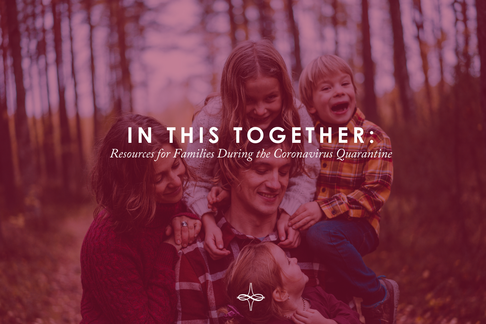



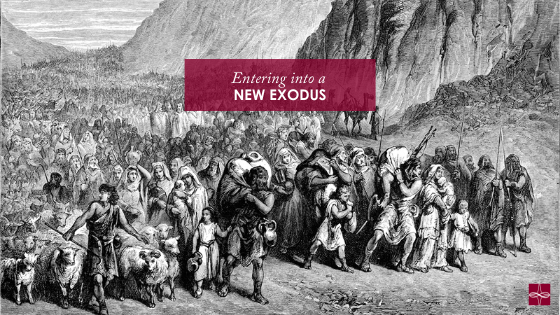

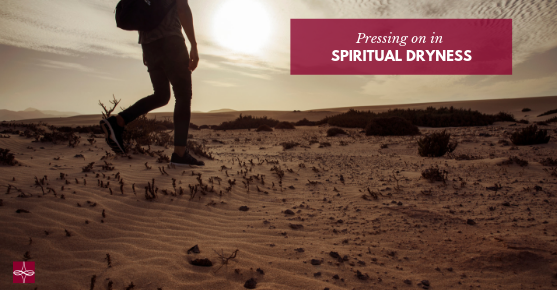

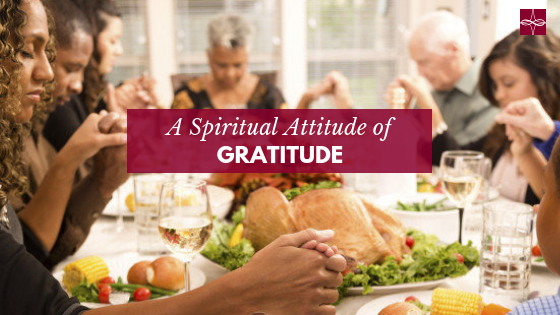

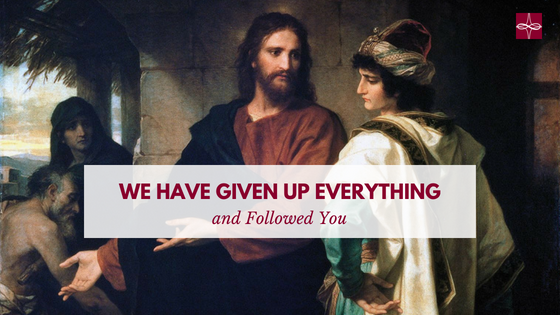
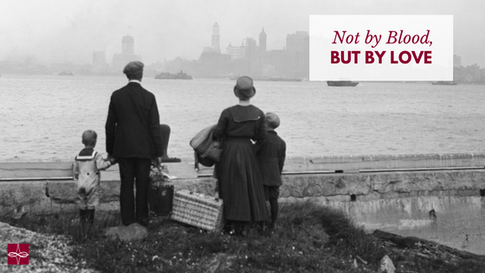



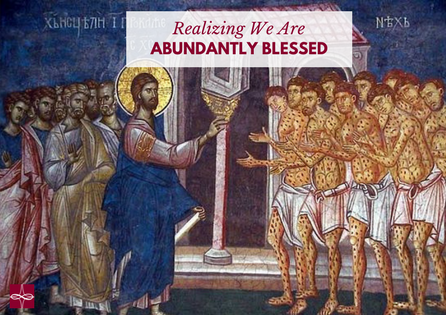

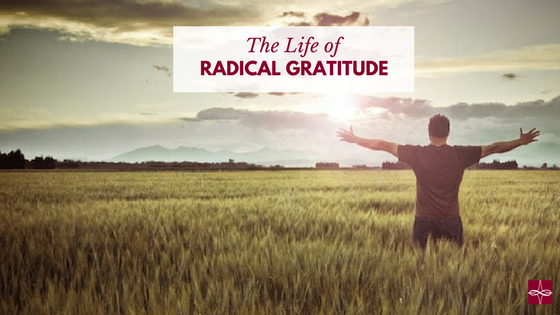



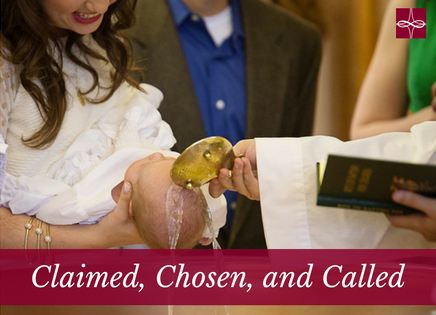



 RSS Feed
RSS Feed